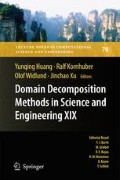Abstract
Adaptive solvers are now widely used in numerical simulations of lots of problems for better accuracy with minimal computational cost. The reasons for choosing adaptive method for the problem (1) are two-folded. First, the grid in the contact zone is often not necessarily as fine as that in the non-contact zone. Secondly, the solution u may have singularity in some local areas.
Access this chapter
Tax calculation will be finalised at checkout
Purchases are for personal use only
Preview
Unable to display preview. Download preview PDF.
Bibliography
M. Ainsworth and J.T. Oden. A Posteriori Error Estimation in Finite Element Analysis. Wiley, New York, NY, 2000.
R.E. Bank and R.K. Smith. A posteriori error estimates based on hierarchical bases. SIAM J. Numeric Anal., 30:921–935, 1993.
E. Bänsch. Local mesh refinement in 2 and 3 dimensions. IMPACT Comput. Sci. Eng., 3:181–191, 1991.
P. Binev, W. Dahmen, and R. DeVore. Adaptive finite element methods with convergence rates. Numer. Math., 97(2):219–268, 2004.
F.A. Bornemann, B. Erdmann, and R. Kornhuber. A posteriori error estimates for elliptic problems in two and three space dimensions. SIAM J. Numer. Anal., 33:1188–1204, 1996.
J.M. Cascon, C. Kreuzer, R.H. Nochetto, and K.G. Siebert. Quasi-optimal convergence rate for an adaptive finite element method. SIAM J. Numer. Anal., 46(5):2524–2550, 2008.
P. Deuflhard, P. Leinen, and H. Yserentant. Concepts of an adaptive hierarchical finite element code. IMPACT Comput. Sci. Eng., 1:3–35, 1989.
W. Dörfler. A convergent adaptive algorithm for Poisson’s equation. SIAM J. Numer. Anal., 33:1106–1124, 1996.
W. Dörfler and R.H. Nochetto. Small data oscillation implies the saturation assumption. Numer. Math., 91:1–12, 2002.
F. Fierro and A. Veeser. A posteriori error estimators for regularized total variation of characteristic functions. SIAM J. Numer. Anal., 41(6):2032–2055 (electronic), 2003. ISSN 1095-7170.
R. Kornhuber. A posteriori error estimates for elliptic variational inequalities. Comput. Math. Appl., 31:49–60, 1996.
R. Kornhuber. Adaptive Monotone Multigrid Methods for Nonlinear Variational Problems. Teubner, Stuttgart, 1997.
R. Kornhuber and Q. Zou. Efficient and reliable hierarchical error estimates for the discretization error of elliptic obstacle problems. Math. Comput., in press, 2010.
K. Mekchay and R. Nochetto. Convergence of adaptive finite element methods for general second order linear elliptic PDE. SIAM J. Numer. Anal., 43:1803–1827, 2005.
W.F. Mitchell. Unified Multilevel Adaptive Finite Element Methods for Elliptic Problems. PhD thesis, University of Illinois at Urbana-Champaign, 1988.
P. Morin, R.H. Nochetto, and K.G. Siebert. Data oscillation and convergence of adaptive fem. SIAM J. Numer. Anal., 38:466–488, 2000.
P. Morin, R.H. Nochetto, and K.G. Siebert. Convergence of adaptive finite element methods. SIAM Rev., 44:631–658, 2002.
K.G. Siebert and A. Veeser. A unilaterally constrained quadratic minimization with adaptive finite elements. SIAM J. Optim., 18:260–289, 2007.
R. Verfürth. A Review of a Posteriori Error Estimation and Adaptive Mesh–Refinement Techniques. Wiley-Teubner, Chichester, 1996.
O.C. Zienkiewicz, J.P. De, S.R. Gago, and D.W. Kelly. The hierarchical concept in finite element analysis. Comput. Struct., 16:53–65, 1983.
Q. Zou. A near-optimal hierarchial analysis for elliptic obstacle problems. In preparation.
Q. Zou, A. Veeser, R. Kornhuber, and C. Gräser. Hierarchical error estimates for the energy functional in obstacle problems. Numer. Math., submitted, 2009.
Author information
Authors and Affiliations
Corresponding author
Editor information
Editors and Affiliations
Rights and permissions
Copyright information
© 2011 Springer-Verlag Berlin Heidelberg
About this paper
Cite this paper
Zou, Q. (2011). A Near-Optimal Hierarchical Estimate Based Adaptive Finite Element Method for Obstacle Problems. In: Huang, Y., Kornhuber, R., Widlund, O., Xu, J. (eds) Domain Decomposition Methods in Science and Engineering XIX. Lecture Notes in Computational Science and Engineering, vol 78. Springer, Berlin, Heidelberg. https://doi.org/10.1007/978-3-642-11304-8_36
Download citation
DOI: https://doi.org/10.1007/978-3-642-11304-8_36
Published:
Publisher Name: Springer, Berlin, Heidelberg
Print ISBN: 978-3-642-11303-1
Online ISBN: 978-3-642-11304-8
eBook Packages: Mathematics and StatisticsMathematics and Statistics (R0)

